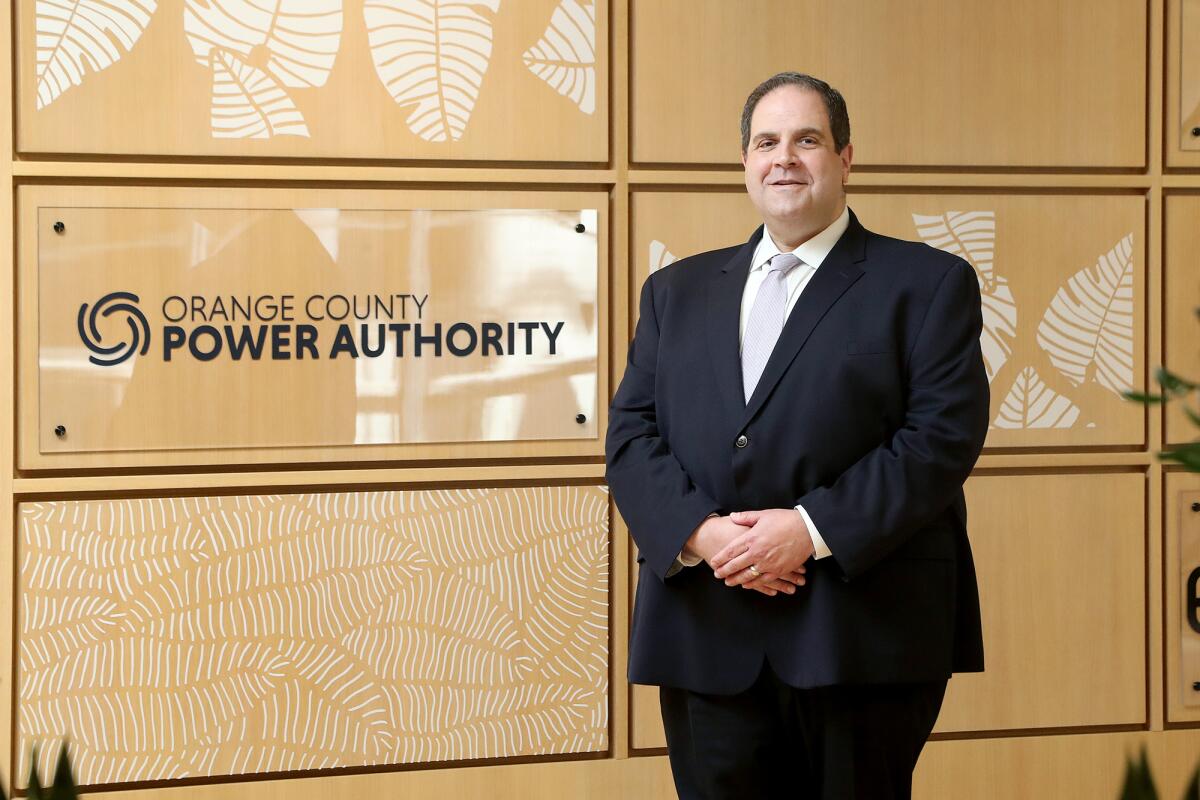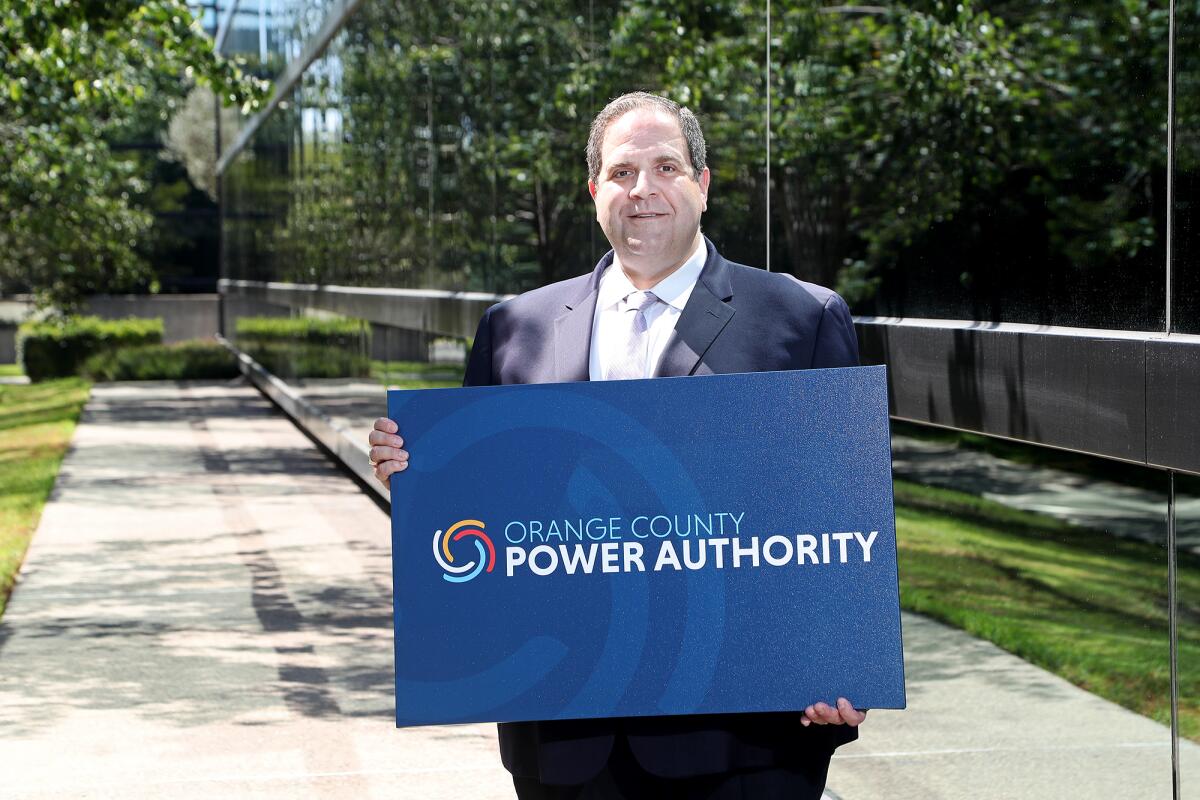OCPA ready to provide residential energy service to Huntington Beach

- Share via
And away we go.
The Orange County Power Authority, which has dealt with its share of controversy in recent months, begins delivering energy to residential customers this month.
Service start times begin Monday, Orange County Power Authority CEO Brian Probolsky said. Residents in the member cities of Huntington Beach, Irvine, Fullerton and Buena Park have automatically been opted into the program.
The default percentage for Huntington Beach customers, along with Irvine and Buena Park, is 100% renewable choice energy. However, they can change that to 38% renewable energy on the basic choice plan or 69% on the smart choice plan.
The Community Choice Energy (CCE) program started commercial service in April, but its residential rollout will allow OCPA to reach thousands more Surf City residents.
“We’re very excited about the launch,” Probolsky said. “We’re excited about being able to bring opportunities back to the community with the focus that we have, which is obviously very different from Edison.”
Unlike Southern California Edison, the law does not allow OCPA to make a profit. Any leftover money instead goes toward lower rates or is reinvested in the communities that OCPA serves.
“They’ve got a shareholder focus, and we’ve got a community and renewable energy focus,” Probolsky said.

Others are far less impressed. OCPA has been under the scrutiny of local politicians lately. In mid-September, state Sen. Tom Umberg (D - Santa Ana) announced that six members of the Orange County Legislative Delegation have requested an audit of the organization, and the Joint Legislative Audit Committee (JLAC) has agreed.
“It’s clear that OCPA has had little oversight,” Umberg stated in the announcement. “With the federal investigations in Anaheim and Irvine concerning public corruption, we owe it to the taxpayers to explain why their energy costs are going up, and who or what is responsible.”
In reality, the 100% renewable is seen by skeptics as a bit of a misnomer. OCPA may be able to purchase fully renewable energy, but the authority will not at this time be able to deliver it to customers as such. Additionally, the price is more expensive than if a resident opts for the 38% rate, which offers the same price as Edison.
OCPA states that an average three-bedroom household using 595 kilowatt-hours (kWh) per month can expect its bill to go up about 3% under the smart choice plan and 5% under the 100% renewables plan. The expectation is that by paying the higher rate, the money will be used to purchase cleaner energy in the future.
“Their rate will increase, but it’s an investment in 100% renewable power for themselves, their kids and grandkids,” said Huntington Beach City Councilman Dan Kalmick, the city’s OCPA board member. “It puts price signals into the marketplace that say, ‘Hey, we need California energy providers to build more 100% renewable power because we’re demanding it.’ That will, in turn, create more supply, which will in fact bring down the price of renewable energy in California.
“It’s a local investment, and then those dollars that they spend go right back into their community as opposed to paying the CEO of Edison $12 million a year.”
Kalmick said once enough cash reserves are initiated, he could see more local incentive programs being offered, like a solar farm on the beach or battery storage on the city property adjacent to the AES powerplant.
“Those are things that other CCAs [Community Choice Aggregation programs] have,” he said. “But other CCAs have been around a lot longer than we have.”
Kalmick said he anticipates that OCPA rates will be cheaper than Edison in the future — and hopefully in the near future.
Still, controversy has continuously clouded the proceedings. In June, an Orange County Grand Jury report criticized OCPA’s perceived leadership and transparency issues. It noted that Probolsky had no previous relevant experience before he was hired in 2020.

The report also found that OCPA did not have budgets, financial statements or rate comparisons published on its website until at least March of this year.
A response from OCPA officials refuted nearly all of the claims made, though Probolsky conceded that the organization has yet to hire a director of power purchases, as the grand jury recommended.
Probolsky said OCPA also will cooperate fully with the JLAC audit.
“We’re concerned by the continued repetition of meritless claims, including questions raised by members of the state delegation,” he said. “No evidence of mismanagement or corruption has ever been put forward, and we expect the audit to put these claims to rest. We are driven by our mission, and we’re not going to get distracted. It’s disappointing that not a single person who’s signed onto that letter has ever contacted us. It seems a little out of order.”
Huntington Beach residents are now presented with a choice, if they will stay opted in or opt out. One of them, Larry McNeely, said he has met with both Probolsky and Kalmick.
McNeely, who has opted out of OCPA for both commercial and residential, said he is all for green energy, “but I won’t be lied to. They’re buying 100% clean energy, but they’re not delivering it,” he said. “That’s a grift. That’s a lie.”
Other residents also have opted out and gone back to Edison, many stating that they resent the fact that they were automatically opted in. But that was not OCPA’s call; state law (Assembly Bill 117, passed in 2002) dictates that it’s done that way.
“Not enough info on pricing and not willing to risk it,” Huntington Beach resident Molly Bell Kiefer said. “Also didn’t appreciate the fact that you would be automatically switched over.”
The debate over OCPA may rage on in future months. Probolsky said the organization is financially strong, though, with $21.5 million in available working capital for the fiscal year that ended in June.
Of the 35,000 commercial accounts started in April, OCPA reports that it has retained more than 92% of those customers.
Costa Mesa resident Linda Kraemer is the Orange County chapter chair of the Climate Reality Project and a big proponent of CCE.
“Many supporters studied the impacts of community choice on other regions in California,” Kraemer said. “These supporters knew it was a good choice for Orange County. The phenomenal and game-changing impact CCAs have had on local energy policy is undeniable. The potential is limitless.”
All the latest on Orange County from Orange County.
Get our free TimesOC newsletter.
You may occasionally receive promotional content from the Daily Pilot.









